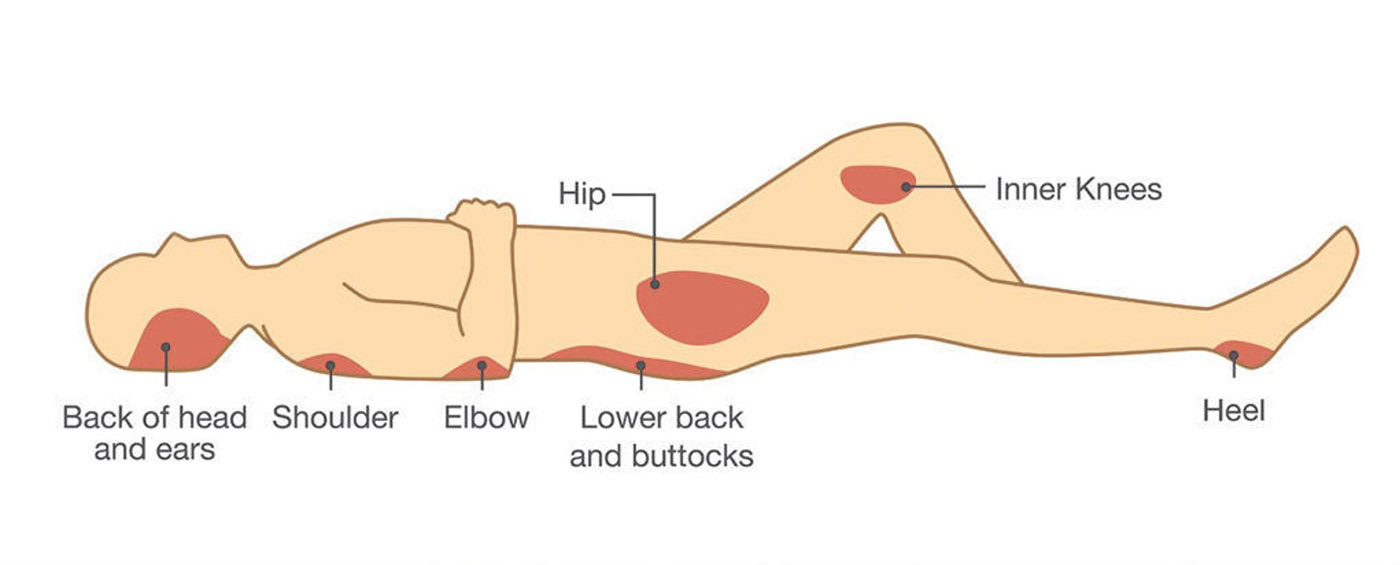Last updated on May 21st, 2025 at 01:25 pm
 Bed Sores Treatment: Bedsores, also known as pressure ulcers or decubitus ulcers, are painful and potentially serious wounds that develop when prolonged pressure on the skin restricts blood flow to certain areas of the body. These wounds often afflict individuals who are bedridden, wheelchair-bound or have limited mobility, making them particularly prevalent in hospitals, nursing homes, and long-term care facilities.
Bed Sores Treatment: Bedsores, also known as pressure ulcers or decubitus ulcers, are painful and potentially serious wounds that develop when prolonged pressure on the skin restricts blood flow to certain areas of the body. These wounds often afflict individuals who are bedridden, wheelchair-bound or have limited mobility, making them particularly prevalent in hospitals, nursing homes, and long-term care facilities.
Bedsores typically progress through four stages, ranging from mild redness and irritation to deep wounds that extend through the skin and into the underlying tissue, muscle, and bone. Factors contributing to their development include prolonged pressure on bony prominences, friction, moisture, poor nutrition, and compromised circulation.
Bed Sores Treatment
Treatment strategies for bedsores aim to alleviate pain, promote healing, prevent infection, and ultimately restore skin integrity. Depending on the severity of the ulcer, treatment may involve a combination of the following approaches:
1. Pressure Relief
Relieving pressure on the affected area is paramount. This may involve repositioning the patient regularly, using specialized support surfaces such as pressure-relieving mattresses, cushions, and pads, and employing techniques to reduce friction and shear forces.
2. Wound Care
Proper wound care is essential for facilitating healing and preventing complications. This may include gentle cleansing with mild soap and water, debridement of necrotic tissue, application of appropriate dressings to promote moisture balance and wound healing, and the use of topical medications to manage pain and infection.
3. Nutritional Support
Adequate nutrition plays a vital role in wound healing. Patients with bedsores may require nutritional supplementation, including protein, vitamins, and minerals, to support tissue repair and immune function. A registered dietitian can help develop individualized nutrition plans tailored to the patient’s needs.
4. Infection Control
Preventing and treating infections is crucial in managing bedsores. This may involve regular monitoring for signs of infection, such as increased pain, redness, swelling, warmth, or drainage from the wound, and implementing appropriate antimicrobial therapies as needed.
5. Surgical Interventions
In severe cases where conservative measures fail to promote healing, surgical interventions such as skin grafting, flap reconstruction, or surgical debridement may be necessary to remove damaged tissue, improve blood flow to the area, and facilitate wound closure.

Bed Sore Treatment Powder
Bed sore treatment powders actively aid in managing pressure ulcers by providing a protective barrier, absorbing excess moisture, and facilitating wound healing. These powders typically contain a combination of ingredients chosen for their antimicrobial, moisture-absorbing, and soothing properties.
Key Ingredients and Functions of Bed Sore Treatment Powder
- Zinc Oxide : A commonly used ingredient in bed sore treatment powders, zinc oxide exhibits antimicrobial properties and helps protect the skin from irritants while promoting healing.
- Calamine : Known for its soothing and anti-inflammatory properties, calamine helps relieve itching and irritation associated with bed sores.
- Starches or Absorbent Powders : Ingredients such as cornstarch or talc are often included to absorb excess moisture, reduce friction, and keep the affected area dry.
- Antimicrobial Agents : Some formulations may contain antimicrobial agents such as chlorhexidine or tea tree oil to help prevent infection and promote wound healing.
Application and Usage of Bed Sore Powder
The application of bed sore treatment powder typically involves the following steps:
- Cleanse the affected area gently with mild soap and water, pat dry, and ensure the skin is free from moisture.
- Apply a thin layer of the powder directly to the bed sore and surrounding skin, ensuring complete coverage of the affected area.
- Reapply the powder as needed, particularly after each dressing change or as directed by a healthcare professional.
- Avoid applying excessive amounts of powder, as this may impede wound healing or cause irritation.
Considerations and Precautions of Treatment
While bed sore treatment powders can be beneficial, certain considerations and precautions should be taken into account:
- Allergic Reactions: Individuals with known allergies to any of the ingredients in the powder should avoid its use and consult a healthcare professional for alternative treatments.
- Wound Assessment: Prior to applying the powder, assess the bed sore to determine its stage, severity, and underlying causes.
- Monitoring: Regularly monitor the progress of the bed sore and the skin’s response to the powder. Discontinue use and seek medical attention in case any adverse reactions occur on the skin.
- Complementary Treatments: Bed sore treatment powder should be used in conjunction with other recommended interventions, such as pressure relief, wound dressings, and nutritional support, for optimal outcomes.
Consult a Doctor and Medkart will help you Order Medicines Online
Conclusion
Bedsores pose significant challenges for patients and caregivers alike, but with timely intervention, comprehensive treatment approaches, and diligent ongoing management, these wounds can be effectively treated and even prevented.
By understanding the underlying causes, implementing appropriate treatment strategies, and adopting preventive measures, healthcare professionals can improve outcomes and enhance the quality of life for individuals affected by bedsores.
Read: What are Generic Medicines?
FAQs on Bed Sores Treatment
Q1. What is bed sores treatment?
Treating bed sores involves relieving pressure, maintaining cleanliness, and using suitable dressings and medications to promote healing. Regular repositioning, maintaining good nutrition, and consulting healthcare professionals for tailored interventions are essential for effective management. In severe cases, surgical interventions may be necessary to facilitate healing and prevent complications.
Q2. Can bed sore treatment powders be used on all stages of pressure ulcers?
Bed sore treatment powders are generally suitable for stages I and II pressure ulcers, characterized by superficial skin damage. However, for deeper wounds (stages III and IV), consult a healthcare professional for appropriate treatment options.
Q3. How often should bed sore dressings be changed?
Dressing change frequency varies based on bed sore severity and characteristics, typically from daily to every few days. Regular assessment by a healthcare professional will guide the optimal dressing change schedule.
Related Links: